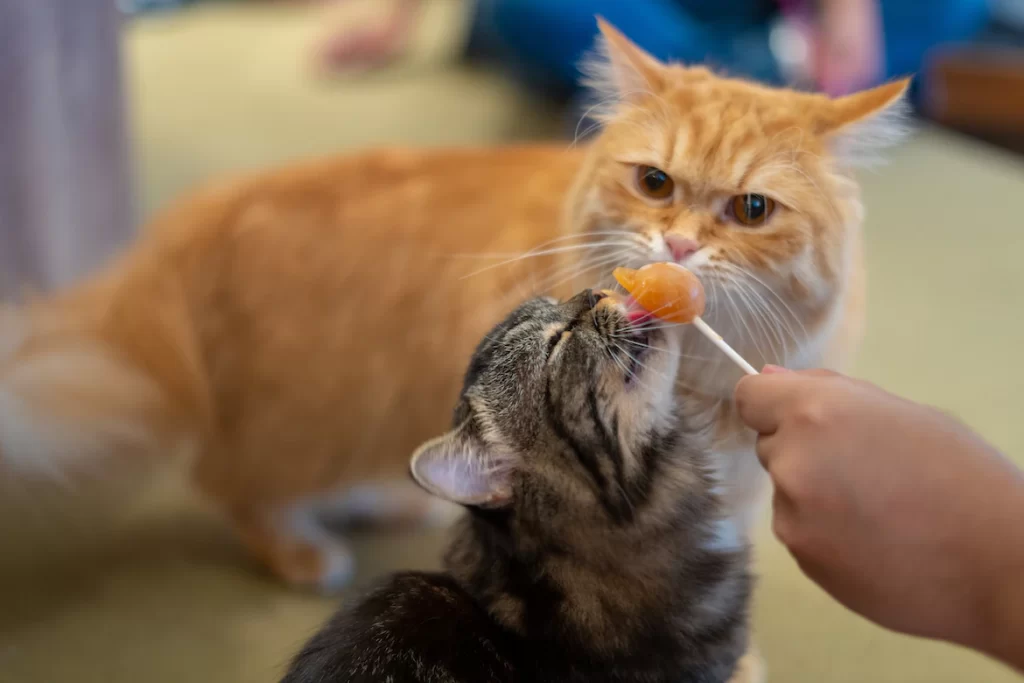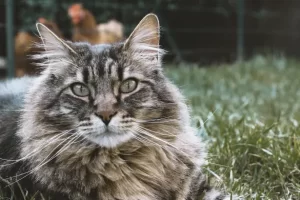Last updated on February 19th, 2023 at 04:14 am

Can cats taste spicy foods? In a scientific sense, the answer is “no,” cats are not capable of tasting the spiciness that is present in food. On the other hand, the capsaicin found in chilies, which is what gives spicy meals their fiery quality, can have the same effect on animals as it does on people. That’s just one of the ice breakers you will encounter in this article. Let’s talk about cats and their taste in spicy food.
Cats and their taste buds
When it comes to physical senses, cats are better than humans in almost every way except taste. Cats only have 470 taste buds, while humans have almost 9,000. Also, cats can’t taste certain things at all, such as sweetness. This is probably because cats are obligate carnivores, which means they should only eat meat.
Meat isn’t usually sweet, so cats don’t need to be able to taste sweet flavors when they eat it. Cats can also tell the difference between bitter and sour tastes, but it’s not because they like to hunt for Sour Patch Kids in the wild. Instead, it’s because those tastes can tell them if what they’re eating has gone bad, which means they should find something else to eat.
What about spicy tastes, though? Meat isn’t naturally spicy, and heat isn’t a sign of rancidity or anything like that, so there’s no reason for a cat to even notice spice. So, the answer is no. Most likely, cats like to taste spicy foods because most of the time, meat is the main ingredient in spicy foods. But the capsaicin in chilies, which makes spicy foods feel hot, can have the same effect on them as it does on people.
Capsaicin and cats
The plant family Capsicum is where your favorite hot chilies come from. This is because the plants in this family have changed so that birds can spread their seeds. Birds’ taste buds are not affected by capsaicin. Also, chili seeds don’t hurt birds’ digestive systems and don’t hurt them when they eat them. The seeds can then grow into something new.
When mammals like humans and cats eat chilli seeds, the seeds are damaged and unable to grow. Capsicum plants have developed this trait to attract animals that spread their seeds and scare away animals that don’t help the plant. This makes us wonder why some people (and, it turns out, some cats) like spicy food. Your brain interprets the capsaicin in spicy food as a painful stimulus. Endorphins, chemicals in your body that make you feel good, are released when you feel pain.
Capsaicin affects cats the same way it affects people. If cats taste something that is too spicy, their noses will run and their eyes will start to bleed. If a cat throws up painfully spicy food, he will feel better. But even a small amount of the meal’s capsaicin can irritate the lining of his throat and stomach. When this happens, he might feel sick, throw up, or have diarrhea until the capsaicin leaves his body.
Is it bad for your cat to eat spicy foods?
Even though most spicy foods won’t make your cat sick, they aren’t good at handling them because cats haven’t evolved to eat things with a lot of heat. The only thing that usually happens when a cat eats something spicy is that it will chew it a few times and then spit it out (and venture off in search of water). If that’s the only thing that happens, your cat shouldn’t have any other problems besides a burning mouth for a few minutes.
But if your cat sticks with it and eats it, you and your cat might have a hard few days ahead. Your pet may feel pain in its intestines because of the capsaicin, which will continue to irritate any tissue it comes into contact with. You probably already know that when a cat has stomach pain, the litter box can smell very bad. It’s not likely that this will hurt the cat long-term, but neither of you will have much fun with this situation until the capsaicin is out of the cat’s digestive system.
You will also need to watch how much water or other liquids your cat drinks. If they eat spicy food, they might not want to drink water, and if they don’t have access to moist foods, they might not get the right amount of water in their diet. Even though it doesn’t happen very often, you should be ready in case it does.
Why are cats seem to be attracted to spicy foods?
The only other animal besides humans that likes to eat spicy food is the Chinese tree shrew. This trait is unique to humans. If this is true and your cat can’t really taste spicy foods, what draws it to them? Here are a few reasons why this could be true.
Aromatic scent
Even though cats don’t have as good of a sense of taste as people do, they make up for it with how well they can smell. In fact, they don’t use their tongues to “taste” food. Instead, they use their sense of smell. If you notice that your pet likes spicy foods, this could be because they have a strong, appealing smell that makes them hungry and makes them want to eat more.
Spicy foods are usually served warm
You’ve probably noticed that cats don’t like to eat the food right out of the fridge. But if you reheat the same food, they will eat it right away and not think twice about it. Since cats eat meat, eating warm food reminds them of just-caught prey, which they find fun. Your cat is drawn to your dinner like a magnet because spicy foods are usually served right after they come out of the oven.
Ingredients
As was already said, spicy foods are usually made with meats like beef, chicken, or lamb, all of which are tasty for cats. In fact, they are used to make food for cats. If your cat seems to like spicy food, it’s probably the meat, not the spice, that he likes.
What Spices are Toxic to Cats?
Spices such as nutmeg, shallots, garlic, and commercially prepared pumpkin spice are toxic to cats. Nutmeg, for example, contains the toxin myristicin. If pets consume too much of this, it can cause confusion, hallucination, gastrointestinal pain, and other symptoms.
Allspice and cloves are also off-limits because they contain eugenol, which causes liver damage in cats. Apart from that, avoid giving your cat garlic. Excessive consumption of this spice might result in hemolytic anaemia. This illness causes red blood cell damage, putting your cat’s life in danger. Even if you add these spices to your cat’s diet for flavor, you must avoid them at all costs.
You also keep an eye on onions, despite the fact that they are five times less harmful than garlic. According to animal toxicology studies, consuming 15 to 30 grams of onion per kilogram of body weight can cause significant red blood cell damage.
Also read: Plants That Are Dangerous To Cats
Can cats eat jalapenos?
No, jalapenos are not safe for cats and should not be fed to them. It contains far too much capsaicin for a domestic cat to manage. Even people who are sensitive to spicy may have stomach distress after eating jalapeno.
A cat who has eaten a jalapeno may vomit and have diarrhea. If you want to enhance your cat’s vegetable consumption, feed it cooked carrots, asparagus, squash, peas, and zucchini. A new study also discovered that forcing your cats to eat spicy foods/peppers will result in a severe lower urinary tract infection.
What should you do if your cat eats something spicy?
Even if cats are able to detect the flavor of spicy food, you shouldn’t give them any of it to eat because it’s bad for their health. If you discover that your cat has taken spicy foods, the first thing you should do is assess the potential toxicity of the meal and the amount that the cat has eaten of it.
You can try to induce vomiting in your cat if it has consumed a potentially toxic spice and a significant amount of it. While you are trying to make your cat throw up, it is important to ensure that it receives enough amount of water in order to prevent dehydration. In addition to this, you can offer your cat some activated charcoal in order to slow down the rate at which toxins are absorbed into its body.
Bear in mind that the purpose of these procedures is solely to stabilize your cat; therefore, you should get in touch with your veterinarian regardless of the situation. Remember to bring some samples of the food that your cat has eaten with you when you take him or her to the veterinarian. This will enable your veterinarian to recommend the appropriate treatment for your four-legged friend.
Conclusion
Do cats have the ability to taste spicy foods? The response to this question is a loud “no.” Spicy food can upset your cat’s stomach and cause diarrhea in your feline friend. In addition, your cat lacks the taste buds necessary to properly interpret the nuanced flavor of spices. Nevertheless, in order to protect your cat’s kidneys from becoming overworked, it would be beneficial if you reduced the amount of human foods you gave it.


